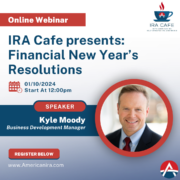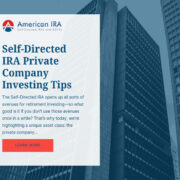Is the Housing Market a “Major Headwind” for the Economy?
A lot of people like to look at housing numbers as a sort of weathervane for the economy. And that often bears out. In the 2007-2009 Great Financial Crisis, housing news led the curve. Eventually this resulted in bankruptcies, a stock market crash, and a disastrous recession. But what are the signals telling us now, and how do those signals relate to anyone who might be investing in housing in a Self-Directed IRA? Here’s our reaction to the latest news.
Housing: A “Major Headwind” Against the Economy?
“Housing has clearly gone from tailwind to headwind for the U.S. economy,” Bill Adams, chief economist at Comerica Bank, told Fox Business. “It will likely subtract from real GDP growth for the next year.”
According to the piece at Fox Business, new economic data recently published is showing that the housing market is showing signs of cooling off. For example, homebuilders’ sentiment about housing is at two-year lows. Buyers, the data suggests, are “retreating from the market as they cancel home sales at the fastest pace since 2020.” Many homebuilders are even rethinking new construction projects.
This all adds up to potential trouble for the economy. Housing is tied into just about everything Americans do. From renovating and furnishing to hiring construction firms who source lumber and other raw materials for a new home. If housing demand is low, it could also spell low supplies on the real estate market. Especially for individuals who want to move to a new place, further tangling the economy.
But it’s not happening in a vacuum. The problems with housing are exacerbated by the high inflation and rising interest rates. This makes it more difficult for investors to take out loans and buy homes. This has the side effect of “forcing potential buyers to pull back on spending,” which has the ability to slow the entire economy.
Housing and Inflation
One of the primary concerns for many investors in the past several months is the troubling rate of inflation. For many investors, including Self-Directed IRA investors, one of the chief hedges against inflation is to own property like real estate. Because real estate is, by its very nature, limited, it means that the supply can be difficult to come by—potentially keeping prices favorable to the investor who bought the property.
The problem is that inflation can lead to homeowners and home builders changing their habits, which affects the cost of housing for everybody. For instance, Fox Business reports that home cancellation rates were higher this year (2022) than last year (2021), which means that buyers are having “jitters over the increasingly dark economic outlook.”
What This All Means for Self-Directed IRA Investors
Housing prices can be complicated to understand, particularly how they relate to the economy at large. But something that’s easier to understand is why Self-Directed IRA investors are interested in real estate investments to begin with. These can add a degree of stability to a portfolio even when there are major headwinds for the economy looming large. For instance, even though home cancellations are up, many real estate properties are still holding on to their value. And even though the stock market can plunge thousands of points in one day, real estate typically moves more slowly than that, giving investors time to plan and schedule their investment strategies.
Interested in learning more about Self-Directed IRAs? Contact American IRA, LLC at 866-7500-IRA (472) for a free consultation. Download our free guides or visit us online at www.AmericanIRA.com.











